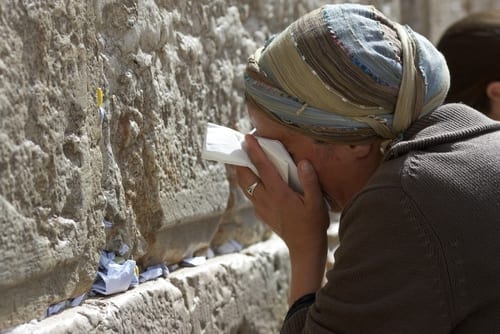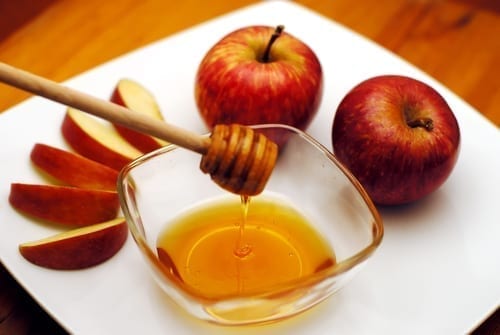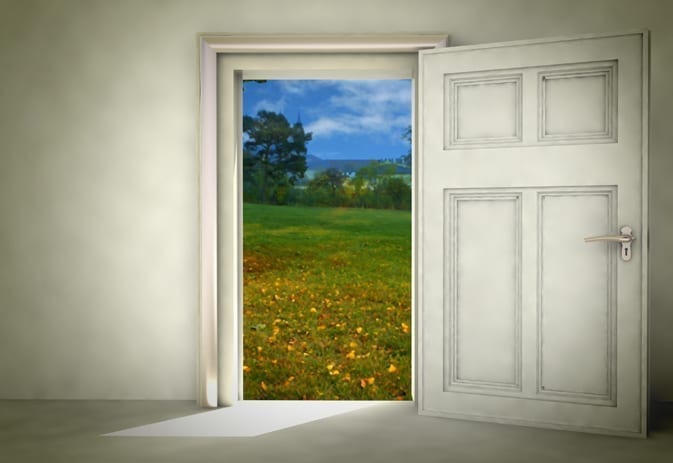Erev (day before) Rosh Hashana
- Very important: Buy your wife a gift
- There’s a custom to nullify vows (Hatarat Nedarim) on this day to come into Rosh Hashana clean
- We don’t say Viduy (confession) in the morning prayers nor in the afternoon and evening prayers
- There is a custom to take haircuts on this day before Rosh Hashana
- We wear nice clean festive clothing for the holiday
- Some have a custom to visit the graves of parents and ancestors
- Men have a custom to go to the mikvah and after the 5th hour of the day is the preferred time one who has no access to a mikvah can pour ‘9 kavim’ of water on himself (about 12.6 liters) or take a shower which will allow that amount to pass over you. (This is not suitable for family purity which can only be done in a proper mikvah)
- The Shofar is not blown on Erev Rosh Hashana and people practicing blowing should do it in a closed room.
Cooking and preparing from first day to second day
- It is rabbinically forbidden to prepare from holiday to a weekday which is not considered respectful to the holiday. Likewise preparing second day food on the first day shows lack of respect for the first day. Therefore:
- Food can’t be prepared from the 1st day for the 2nd day
- Likewise washing day 1 dishes and setting for day 2 during day 1 is prohibited
- Preparing day 1 food and settings for later in day 1 is permitted even from the first night to the next morning
- This year we make an Eruv tavshilin which permits us to prepare Shabbat food this Rosh Hashana which leads right into Shabbat. (This eruv is based on the principle that preparing the Shabbat food already began before the onset of Rosh Hashana so you’re not especially preparing on rosh Hashana for Shabbat, you’re just continuing from beforehand)
Lighting the candles For Rosh Hashana
- Candles are lit for Rosh Hashana (just Like Shabbat)
- Candles are lit both days of Rosh Hashana
- Recommendation: A 48 hour candle should be lit before Rosh Hashana to have fire to light from as kindling a new fire from scratch is prohibited on Rosh Hashana
- Sephardi women make a blessing and light Ashkenazi women light , cover their eyes and make a blessing
- Ashkenazi women bless ‘To light the candles of yom tov’ and Shehechiyanu, Sephardi women only say the first blessing and wait for Kiddush to hear the Shehechiyanu
The Night meals and the ‘Simanim’ (good omens)
- Kiddush is said by the night meals and the day meals of Rosh Hashana as is found in the Siddur or Machzor
- Shehechiyanu is said in Kiddush the 2nd night and it is preferable to have a new fruit or garment before him so the blessing can go on that. if you don’t have a new fruit or garment Shehechiyanu should be said anyway
- Our sages instituted eating Simanim on the nights of Rosh Hashana for a good omen for the new year such as:
- Dates
- Black eyed peas
- Kara –gourd or pumpkin
- Leeks
- ‘Silka’ which is spinach or beets
- Pomegranate
- Apple in Honey
- Meat of a head (of sheep, cow or fish)
- The Simanim should be eaten both nights of Rosh Hashana see your machzor for appropriate supplications to say with each food asking for a good omen

Making the Seder of the Simanim
- Wash hands for challah and make hamotzi and eat an olive equivalent of challah (27 grams) before starting to eat the simanim
- Some have a custom to say the ‘Yehi Ratzon’ of each siman before blessing on the fruit but it is better to bless on the fruit first and then say the ‘Yehi Ratzon’
Other customs
- People avoid sour or bitter foods on Rosh Hashana and eat sweet food for a sweet upcoming year
- Fatty and tasty foods are also eaten for a good omen
- Some bring an Etrog (citron) and say Yehi Ratzon may it be G-d’s will that we are glorified with mitzvoth as etrog is called Hadar which means glorified
The importance of Rosh Hashana
- People should avoid getting angry on Rosh Hashana. Anger should be avoided all year round but it is especially bad on Rosh Hashana so a person should try and be happy and calm on Rosh Hashana and avoid anger
- The Mishna of Rosh Hashana is learned, it has 4 chapters some people learn 1 chapter each Rosh Hashana meal
- Other words of Torah also add to the decorum and reverence of the day and should be said during the meal
- The day should not be squandered on foolishness and mirth or the mundane rather a person’s happiness should come from being stimulated with words of Torah and inspiration
Morning prayers and Shofar blowing
- The morning prayers are as found in the machzor
- Hallel is not said on Rosh Hashana
- Before Mussaf (some during Mussaf) and after Mussaf the shofar is blown
- Men are Biblically required to hear the Shofar on Rosh Hashana women and children are biblically exempt but women hear the shofar and it is praiseworthy children that make noise and disturb the prayers or the shofar blowing should not be brought to Synagogue
- Shofar can be blown from sunrise to sunset so someone who missed the blowing in Synagogue can have someone blow for him for the duration of the day
- The Shofar should be covered until used for blowing and be held when making the blessings for blowing
- The congregation is aroused by the rabbi or speaker before the shofar blowing. The blower has in mind all the listeners should hear his blessing and be counted with his blessings before blowing the Shofar and the congregation should listen and have in mind to be counted with the blowers blessings
- Shofar must be blown on both days (with the exception of a day of Rosh Hashana that falls out on Shabbat)
- People shouldn’t talk after the blessings until after the last blasts at the end of Mussaf so the blessings will be uninterrupted
- People should hear the 30 sounds minimum as brought down in the machzor
- Someone who couldn’t hear the shofar at synagogue should have someone blow for him and he should make the blessings himself if he knows how. 2 blessings, ‘to hear shofar’ and Shehechiyanu the 2nd day only ‘to hear the shofar’. If he doesn’t know how to say the blessings the blower should bless for him and the listener should say amen

Holiday obligations and prohibitions
- Meals should include meat and wine as it is a festive day but someone needn’t overdue it and compromise on the reverence of the day
- Cooking is permitted as long as you don’t light a new fire rather you use an existing fire to cook or pass to another fire
- Fires cannot be extinguished on the Yom Tov but some permit cooking and overflowing so the overflow puts out the flame (though someone must be around to turn off the gas or it can be fatal) the food that was cooked till overflowing must be used for the holiday that day
- Matches (you lit from another flame) should not be put out rather they should lay on a non-flammable surface and go out by themselves
- When lighting a gas on the range first pick the gas amount and then bring the fire to ignite it so as not to make a small fire bigger
- You cannot make a fire smaller but if the food still needs to be cooked and it may burn some opinions say you can lower a flame for that
- Cooking is for that day of the holiday alone
- You cannot cook from day 1 to day 2 an eruv tavshilin does not help for this
- Cooking from Yom Tov to Shabbat is permitted only if you made an eruv tavshilin before the holiday began
- Grating is permitted
- Squeezing lemons for food is permitted but other fruits are not permitted to be squeezed
- Opinions differ as to bathing in a hot shower, please consult your rabbi
- Muktza things that can’t be touched like money or things used for labor forbidden on Shabbat and Yom Tov still applies on Yom Tov and these items should not be touched or picked up
- Peels and bones are also muktza so they should be removed from the table when resting on a plate with some bit of food so you’re taking the muktza along with food in a dish carrying both
- You can break or make ice on Yom Tov
- Medicine forbidden on Shabbat is forbidden on Yom Tov
- Timers for appliances like stoves or lights should be set only before the Yom Tov
- This year Shabbat is right after Rosh Hashana so people should be careful to light the Shabbat candles before sundown on Friday
May you blessed with a great year full of goodness, health, happiness and closeness to G-d!
0 19 6 minutes read





